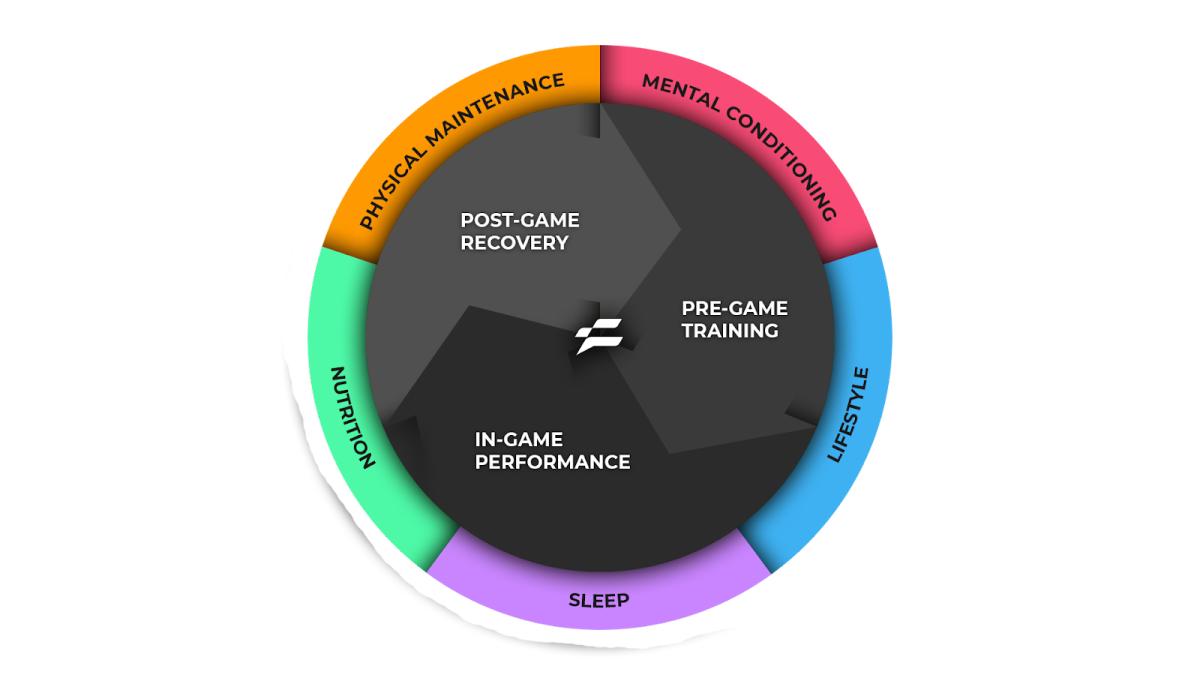The 5 Pillars of Health and Performance

The foundation of performance is built upon having a solid baseline of well-being. When it comes to obtaining optimal well-being, we must be taking in the whole landscape of health, not just focusing on one aspect. For instance, if we focused solely on sleep and neglected our nutrition, physical activity habits, or mental wellness it could lead to a misbalance within our overall physical and mental well-being.
To learn more about staying healthy while gaming, visit our friends at FITGMR.gg!
Another way to think about this is by using the physiological term ‘homeostasis’. The definition of homeostasis is: “any self-regulating process by which biological systems tend to maintain stability while adjusting to conditions that are optimal for survival” (1). Our bodies like to operate within a relatively tight window of tolerance. But things are never static. We are highly influenced by our environment and external factors. We adapt dynamically to maintain this level of equilibrium.
Similar to the way a thermostat helps to maintain the temperature of a room, by either heating or cooling the room depending on the desired temperature, our bodies do the same. Hunger, thirst, and fatigue are all signs that we are straying away from our ideal equilibrium and that something needs to be done to help us return to our ideal state.

Using this framework (see FITGMR framework image), the FITGMR Performance System has been built upon the 5 pillars of health: physical maintenance, mental conditioning, lifestyle, sleep, and nutrition. These pillars were informed by sports science research literature and cognitive performance research, and from working with high-performing teams and individuals. It is a comprehensive approach that helps players reach peak performance levels and build a foundation for long-term success. Let’s take a brief look at each of the 5 pillars and see how they relate to the health and performance of gamers.
Sleep
Sleep is important to our health as it affects our energy level, mood, performance, and quality of life. Monitoring and optimizing sleep is essential for peak performance. Sleep is essential for physical and mental recovery, which can help esports athletes to perform at their best. Poor sleep can negatively affect reaction time, decision-making, and cognitive function, which can all impact performance in the game. Esports athletes should aim to:
- Get 7-9 hours of sleep per night and maintain a consistent sleep schedule
- Building habits that promote falling asleep at bedtime
- Minimizing sleep disturbances
Nutrition
You are what you eat, so if you only eat chips you’ll play like one, crumbling under the pressure. Nutrition plays a critical role in gamers’ mental and physical health. Proper nutrition can improve or weaken the effectiveness of training efforts. A balanced and nutrient-dense diet can improve energy levels, mental clarity, and physical endurance, all of which are crucial for esports performance. Without quality foods eaten in appropriate quantities, no cognitive athlete can achieve their full potential.
A good nutritional framework consists of:
- Consuming foods that are rich in protein, complex carbohydrates, healthy fats, vitamins, and minerals to fuel bodies and minds for optimal performance
- Eating in moderation a nutritious diet full of meat, fish, eggs, nuts, and lots of different vegetables and some fruit
- Strive to eat largely whole good by minimising additives, preservatives and other harmful ingredients
Physical maintenance
Movement is medicine and regular physical activity is crucial for maintaining overall health and preventing injuries in esports. As highlighted in the previous article here, sedentary time is not great for the body and can lead to a myriad of health issues. It can also lead to muscle imbalances, poor posture, and joint pain, all of which can impact performance in the game. Incorporating physical maintenance can help esports athletes find and maintain optimal health. Aspects to consider include:
- Fitness training to build and maintain strength and stamina
- Quick drills (mini exercises) to help competitors return to peak readiness during gameplay
- Ergonomic considerations to avoid injury
- Practicing yoga to create body awareness and mental and physical ease
Lifestyle
We believe that it is vital for a gamer to become a well-rounded person. We encourage taking part in activities that increase your abilities by expanding your scope beyond the game console/rig. Having hobbies or other interests, through to time spent in nature are all beneficial to physical and mental well-being.
There is a growing body of research that is highlighting improvements in health and well-being by simply being outdoors in nature. Being outdoors in nature has been shown to lower the probability of cardiovascular disease, reduce stress, enhance happiness, lower blood pressure, boost immune function, improve cognitive ability, and improve creativity (2, 3, 4).
Mental conditioning
Esports and gaming are highly cognitive. Performance is influenced by the psychological, mental, and emotional state of esports athletes. If athletes are under-aroused, emotionally drained, or lacking focus, they won’t meet their potential. Due to the substantial cognitive effort required for peak performance, cognitive athletes are even more susceptible to mental performance fluctuations than traditional sports athletes. The pressures of competition and training can be stressful and take a toll on mental well-being. Players should aim to develop a positive mindset, manage stress levels, through the use of yoga, meditation, and mindfulness and seek professional support when needed to maintain good mental health. Mindfulness meditation has been shown to cause positive changes in the structure and function of brain regions involved in the regulation of attention, emotion, and self-awareness (5).
Mental skills and conditioning training can:
- Improve emotion and attention regulation
- Increase resilience and fortitude
- Help with team dynamics and communication
- Prevent burnout
Summary
Through the use of the 5 pillars of the health framework, everyone is able to monitor their progress in each area and seek out advice and help where it is needed, with the goal of reaching their own optimal performance. Learn how focusing on these key areas of health can not only improve your performance in-game but also your overall well-being. Take stock of your own health pillars and see where there are areas of opportunity for you to maximize your own performance potential. And if you’re looking for help, feel free to reach out, we’re happy to assist you in leveling up your well-being and gaming performance. You can find out more about this at FITGMR.
References
- https://www.britannica.com/science/homeostasis
- White, M. P., Alcock, I., Grellier, J., Wheeler, B. W., Hartig, T., Warber, S. L., Bone, A., & Depledge, M. H. (2019). Spending at least 120 minutes a week in nature is associated with good health and wellbeing. Scientific Reports, 9(1), 7730. https://doi.org/10.1038/s41598-019-44097-3
- Hartig, T., Mitchell, R., de Vries, S., & Frumkin, H. (2014). Nature and Health. Annual Review of Public Health, 35(1), 207–228. https://doi.org/10.1146/annurev-publhealth-032013-182443
- Shanahan, D. F., Fuller, R. A., Bush, R., Lin, B. B., & Gaston, K. J. (2015). The health benefits of urban nature: How much do we need? BioScience, 65(5), 476–485. https://doi.org/10.1093/biosci/biv032
- Tang, Y. Y., Hölzel, B. K., & Posner, M. I. (2015). The neuroscience of mindfulness meditation. Nature Reviews Neuroscience, 16(4), 213-225.
